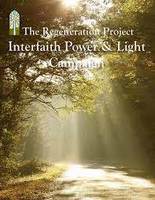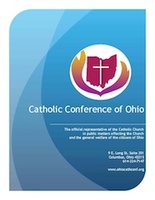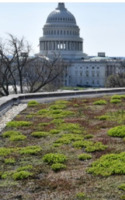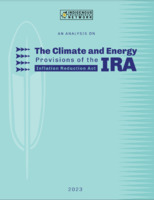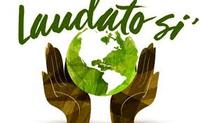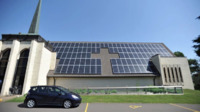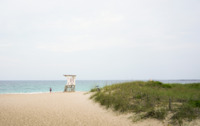Search
140 items
-
6 Ways to Green Your Holiday
6 Ways to Green Your Holiday is a graphic made by the Sierra Club. It gives 6 easy ways make Christmas traditions more sustainable. To view the image, click below or *download* -
The Regeneration Project
The Regeneration Project was created as the parent project of Interfaith Power&Light. It is meant to help deepen the connection between ecology and faith and to help people of faith recognize and fulfill their responsibility for the stewardship of creation. They do so through educational programs for clergy and congregations -
Wade in the Water
Wade in the Water is a worship resource from the New Community Project. It calls for the stewardship of water and is a 20 minute worship service, including a hymn, about water as a precious resource. To read or download Wade in the Water, see below. -
Start 2018 by Speaking Up for God’s Creation
Young Evangelicals for Climate Action posted an article on how to speak up for God’s creation. The article focuses on The Clean Power Plan and how to effectively speak up to stop the repeal and replace of the plan. -
Sikh Statement on Climate Change
EcoSikh has created the groundwork for a Sikh environmental theological foundation, and the inspiration to connect Gurbani (hymns in the central text of the Sikhs) to the state of the environment today. This is the first of its kind from the Sikh community and it outlines new actions Sikhs can take to strengthen their connection to their faith through environmentalism. The following quote is an excerpt from the statement:
“You, Yourself created the Universe, and You are pleased…You, Yourself the bumblebee, flower, fruit and the tree. You, Yourself the water, desert, ocean and the pond. You, Yourself are the big fish, tortoise and the Cause of causes.” -
Global Faith Leaders Unite to Restore our Earth’s Balance
A campaign by Religions for Peace, worldwide religious leaders call on heads of state to respond urgently to the threats of climate change, commit to 100% renewable energy by 2050, and build a more flourishing, inclusive, and balanced world. Leaders of the Buddhist, Christian, Hindu, Indigenous, Islamic, Jain, Jewish, Shinto, Sikh, Taoist, and Zoroastrian faiths pledge to do their part by embracing the moral responsibility to care for our world. -
Catholic Bishops Push Ohio Towards Clean Energy
The Catholic Bishops of Ohio are against an indefinite freeze of Ohio’s clean energy target standards. The Ohio Mandates Study Committee has called for this freeze due to a need for continual studying of energy standards and their impact on the state. The Bishops, however, feel that there is no need to freeze the standards, as alternative energy sources benefit the environment as well as society.
This is not the first time that the Bishops of Ohio have voiced such a stance. Back in 2014, a similar issue arose with SB 310, which proposed the original freeze of Ohio’s advanced energy portfolio standard that was established by SB221. The Bishops voiced opposition to SB 310 at that time. -
Water Issues in Appalachia
Some people may think that water issues in the United States only exist in the west. This is far from the truth. In addition to algae bloom issues throughout the midwest, the Appalachian region of the United States has been experiencing severe water contamination due to mining and chemical spills for the past several years. Fortunately, the residents of this region are kept informed by the Catholic Committee of Appalachia. Once a year, residents from all over the state meet in one location to discuss the issues of their region and try to come up with solutions. -
The Supreme Court and The Clean Power Plan
The Clean Power Plan was designed to allow states the greatest flexibility in implementation, attempting benefiting the health of individuals by improving the quality of the air for everyone. The Supreme Court has ruled to stay the implementation of the Clean Power Plan (5-4 ruling). Many churches and faiths have banded together to express their dissatisfaction with this decision. A predominant tenet of most religious organizations is their concern with protecting the health and well-being of vulnerable communities and God’s Creation. -
United Methodist Agency Green Roof
John Hill, from the Board of Church and Society at the United Methodist Agency, narrates the video below about their recent green roof addition. The series of squares used covers the entire area of the flat roof, reducing energy consumption, making the building cooler in the summer and warmer in the winter. In addition, and equally important, it reduces storm water runoff. When it rains, the water remains in the roof rather than adding pollutants into the nearby watershed, which feeds into the Chesapeake Bay. -
The Sacredness of Water
This chapter from the student-written book “Emerging Perspectives on Religion and Environmental Values in America” explores the importance of water across religious traditions and modern life. It explores the importance of water for survival but also as a gift that frequently acts as a spiritual symbol. Below is the first paragraph of the chapter to introduce the discussion.
"Pick up any religious text and you are likely to find at least one reference to water. Whether it is used to cleanse, bathe, heal, restore, replenish, or purify: water is one of the most prolific symbols in major world religions, stretching through time, place, and culture. As human beings, this may come as no surprise seeing how our bodies are composed mostly of water, and we rely on it for our very survival – a truth that continues to become more resonant as the effects of climate change take hold in the forms of drought, rising temperatures, and natural disasters. Like many religious symbols, water appears in scripture, ritual and tradition through its simplicity and use in everyday life. In examining a variety of major world religions, namely Islam, Judaism, Hinduism and Christianity, connections between water as a common resource, and water as a sacred and holy gift become apparent. Drawing from these unique and similar understandings of water, we can begin to consider the spiritual motivations one might have in engaging in water conservation efforts. Furthermore, in exploring these religions specifically, we can identify some beliefs about water that may provide helpful wisdom in the face of more rational conversations surrounding water conservation. Because these religions have such strong relationships with water and large followings worldwide, there is hope that these connections between scripture and our contemporary crisis may be brought to life to move toward a more secure and just future." -
An Analysis on the Climate and Energy Provisions of the IRA
"The purpose of this research report is to provide an advocacy tool to Indigenous Peoples and environmental justice communities to help develop strategies, as well as to foster inquiry and information gathering regarding many of the IRA programs and funding schemes. Indigenous Peoples have recognition in the colonial legal system of Tribal Sovereignty, inherent customary rights, and Treaty reserved rights. In addition, Indigenous Peoples also have their respective Traditional Indigenous Knowledge which serves as a foundation among other things of their legal systems, inherent responsibilities to land, air and water, and the inherent relationships embodied in all of this. If unchecked, and without Free, Prior and Informed Consent, or at the very least meaningful consultation standards that are legally enforceable, much of what is in the IRA will potentially have impacts on many Indigenous Tribal interests." -
Scripture Sunday: Invitation to the Thirsty
"Walter Bruggeman has said that the task of the prophet is 'to nurture, nourish, and evoke a consciousness and perception alternative to the consciousness and perception of the dominant culture around us.' Here in Deutero-Isaiah, the Israelites who have been exiled are given a vision of hope, Isaiah is evoking a reality far different from what they know. In the previous chapter, God says, in one of my favorite verses, 'For a brief moment I abandoned you, but with deep compassion I will bring you back. In a surge of anger I hid my face from you for a moment, but with everlasting kindness I will have compassion on you… My unfailing love for you will not be shaken nor my covenant of peace be removed' (Isaiah 54:7-10). This is the climax of the second book of Isaiah, that God’s anger towards injustice and the consequences of it are momentary, but God’s compassion, love, and faithfulness are everlasting, something we can never be separated from. Isaiah 55 then flows into the specifics of that love. God’s invitation into divine care is one that freely gives water, food, and rest." -
Don’t believe the “Hydrogen Hype” - Reject all applications for Department of Energy Regional Clean Hydrogen Hubs (H2Hubs) funding (DE- FOA-0002779)
"Dear Secretary Granholm and Director Crane,
We urge you to reject all hydrogen hub applications, as has been repeatedly requested by environmental and environmental justice organizations nationwide. Here, we write in solidarity with the 2023 letter from the New Mexico No False Solutions Coalition (NMNFS), building on the points they have raised and the fights ongoing in communities from the Southwest to the Northeast. A large-scale buildout of hydrogen infrastructure will further exacerbate the climate crisis and disproportionately harm people of color, low-income communities, and Indigenous peoples..." -
A Bluer Theology: Protecting and Restoring God’s Marine Creation
"Blue Theology was founded in 2008 by Rev. Dan Paul and Rev. Deborah Streeter. Streeter coined the term “Blue Theology” as a theological approach that weaves together marine biology and Christian theology. Over the next few years, the Church, only blocks from the Pacific Ocean, began hosting weeklong groups to engage in learning-serving experiences with God’s marine creation. Over the last two years, Blue Theology Outposts have opened in Newport Beach, CA, Texas City, TX, and Beaufort, NC. The mission of the Blue Theology program is to provide learning and serving experiences in ocean conservation while fostering heart connections to the sea." -
Sacred Lands, Sacred Waters: Theological Reflections on This Sacred World
"The lands and waters of this world are sacred places. We know it when we rest in them and we know it from our sacred texts. As Christians, to see the world as creation is to see the world as sacred.
This resource includes theological reflections from Karyn Bigelow, Avery Lamb, Dr. Miguel A. de la Torre, Rev. Victoria Loorz, Rev. Dan Paul, and Rev. Dr. Randy Woodley.
This resource was originally published for Season of Creation 2022." -
Laudato Si’ -- On Care For Our Common Home
Laudato Si appears to be increasing interactions between environmental professionals and faith communities, and as such, is a very important document for all people to understand–not just Catholics! Roman Catholicism is the largest religious denomination in the world (1.2 billion). An encyclical is one of the most authoritative declarations that a Pope can put forth. Laudato Si is both a reflection of the larger moral and religious landscape of environmental values, and perhaps simply the most prominent such statement of values yet crafted. It is symbolic of this moment in time when religious and ethical voices are gaining currency in environmental thinking, regardless of any particular doctrine.
-
Sustainability Photo Contest
This RESTORExchange photo contest is being brought back from the pre-COVID era, and with an added collaboration with the Sustainability Institute. It's based around the question "What does sustainability look like?" This can include sustainability in environmental justice, technology, energy, lifestyle and wellbeing, society and culture, economy and politics, and any other context where you see sustainability in action. We want to see your perspectives and show all the different places that sustainability is practiced! Winning photos will be decided by a panel of judges (yet to be determined), and the top four photos will win a prize! First place will receive $400, second place will receive $300, third place will receive $200, and an honorable mention will receive $100. Submissions will be accepted through March 15, 2023. -
Congregational Solar Resources
"This is a great time to put solar on your church, synagogue, mosque, or other faith community property with the new federal funding available for nonprofits through the Inflation Reduction Act. It’s like a sale on solar, a 30% discount! The 1300 IPL congregations listed in the directory below have the combined capacity of 105 Megawatts of solar – approaching the amount of FaceBook, the 10th largest commercial user. Save on your energy bill and have more for your mission. Read below to find out how to fund solar on your church building, find a solar installer, and get an award." -
From the Ground Up: An Adult Outdoor Education Program
AKA Our Deen is Green! for Adults"We are happy to announce that applications are now being accepted for From the Ground Up: An Adult Outdoor Education Program (aka Our Deen is Green! for adults). This special program, funded by a grant from the National Park Service Chesapeake Gateways Office, will begin after Ramadan, in late April 2024, and continue into spring of 2025. It is a unique opportunity to become immersed in the various facets of ecology, environmental science, sustainability and stewardship. It will include monthly classes, mostly in-person and outdoors in parks and wildlife sanctuaries in DC, Maryland, and Northern Virginia, focused on specific aspects of and issues pertaining to our local region, the Chesapeake Bay Watershed.
Classes will be led by local subject matter experts and include a variety of topics, including local plants and animals, the interconnectedness of our watershed, the challenges it’s facing, and what we can do to help. Specific classes will include:
· An introduction to the Chesapeake Bay Watershed
· Local herps: reptiles and amphibians
· Monitoring stream health with benthic macroinvertebrates
· Stream restoration and invasive plant removal
· The importance of native plants and pollinator gardens
· Watershed education through an interfaith lens
· Native trees
· Soil health
· Environmental justice
· Local birds and “bugs”
· Solar power and clean energy
· Sustainable living
· Water-quality monitoring
· And more!
We are looking for 10-15 strongly committed local residents who are interested in learning about our local watershed, its needs, and what they can do to help it. Participants will be encouraged to create a long-term project or plan of action describing something they will do to support the watershed and/or encourage their families or communities to pay more attention to environmental issues.
Program participants must be able to commit to the majority of the monthly classes. All in-person classes will take place on weekends and last 2 to 4 hours. (We will do our best to help provide transportation if necessary.)
This entire program is being offered free of charge thanks to a National Park Service Chesapeake Gateways grant. The National Park Service Chesapeake Gateways Office (NPS Chesapeake Gateways) offers competitive grant opportunities to advance the Chesapeake Bay Initiative Act of 1998 within the full 41-million-acre Chesapeake Bay watershed. Chesapeake Gateways grants bring out familiar, untold, under-appreciated, or yet to be uncovered narratives and promote resilient communities & landscapes through tourism, sustainability, conservation & local economies throughout the Chesapeake Bay watershed.
The program begins after Ramadan, with the introductory class set for April 21st! Applications are due by March 8th. Access the application form below. Please reach out to us at contact@greenmuslims.org with any questions." -
Rising: Dispatches from the New American Shore
This resource contains a series of vignettes following Elizabeth Rush as she meets people all around American who have been affected in some way by global sea rising, as well as some of her own personal experiences. She gives voice to those otherwise not heard, and shares eye opening testimonials from those who experience the effects firsthand. -
A Walk with Sustainability…and the Bolivian Llamas
"In this picture, I am working alongside two rural Bolivian community members (and a llama), collaborating on the design of a water system. The community had no running water, phone service only on hills, cut plastic liter bottles in half for gutters, and still gave me soups and meals as a welcoming and thankfulness. Their kindness, harmony with the land around them, and joy radiated, deeply resonating with my idea of how to live a sustainable, happy life. Sustainability is not buying a reusable water bottle…every 3 months because a new, better, more cool version is here. It is living in gratitude and simplicity with the people and nature around you." Taken by Megan Oleksik. Submitted to the RESTORExchange Sustainability Contest. -
Capturing the Essence of Sustainability at Halifax Public Garden
"Capturing the essence of sustainability at Halifax Public Garden. This picturesque view of the tranquil lake connects the myriad benefits of green spaces, from promoting social connections and mental well-being to enhancing physical health and fostering equity within our communities to improving water and air quality. Serving as a reminder of the crucial role green spaces play in fostering sustainable communities. By preserving and nurturing our natural environments, we not only enhance our quality of life but also safeguard the health of our planet for future generations. Let's continue to embrace and support sustainability efforts for a greener, more resilient world." Taken by Aklema Iryn. Submitted to the RESTORExchange Sustainability Photo Contest. -
Friends Enjoying the Beach During the Off Season
"Friends enjoying the beach during the off season. The sound of crashing waves creates a feeling of serenity and reminds us how important it is to protect the ocean." Taken by Hailey Irving. Submitted to the RESTORExchange Sustainability Photo Contest. -
As Dusk Dawns
"This photo was taken in Paulding County Ohio. In the back ground is Haviland Tile and their new small ethonal plant. All bringing sustainability together." Taken by Jamie Merriman. Submitted to Sustainability Photo Contest.


